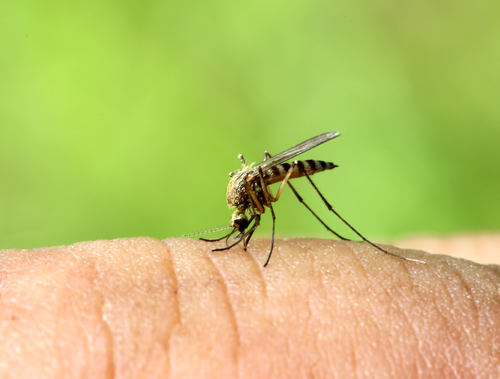Bug Defense: All-Natural Protection from Insects
Posted by Katie Zapotoczny on 17th Jul 2015

We are well into “bug season” now, and if you happen to be someone who attracts biting insects, then keeping bug repellant on hand is probably a must for you. There are many insect repelling options out there, but some of them- especially those made with DEET- may have a negative impact on your health. If you’d prefer to find an effective, toxin-free bug repellant, look no further. Verefina’s Bug Defense is made with a blend of essential oils that can deter a variety of insects- without the harmful side effects.
My family and I have used Bug Defense for the past two summers with excellent results. It keeps the bugs away from my kids and me, and my husband, who generally gets “eaten alive” has also reported that it works well for him.
In addition to being effective, Verefina Bug Defense is 100% natural. It contains insect-repelling essential oils in a base of neem and fractionated coconut oils. Many plants use essential oils to defend themselves from various insects (source). Bug Defense is formulated with nine essential oils that are particularly useful for repelling various critters: citronella, eucalyptus, cedarwood, lemongrass, lavender, litsea cubeba, tea tree, patchouli, and catnip.
Citronella essential oil is derived from a plant related to geraniums. This oil works by masking the scents that generally attract insects, thereby making it difficult for them to find their targets (source). It has been used as an insect repellent since 1948.
Eucalyptus is a popular ingredient in natural bug repellants because it can help repel mosquitoes. A 2010 study found that this essential oil is also effective at deterring the sandfly (source).
Cedarwood essential oil is obtained from the steam distillation of pieces of cedar wood. It is useful for repelling flies, mosquitoes, and other pests (source).
A relative of citronella, lemongrass has a stronger, spicier scent that many biting bugs will avoid. It is especially effective against horse flies and mosquitoes.
Lavender essential oil is a popular oil with a wide range of uses. While it gives off a sweet, floral scent to humans, many insects are repelled by linalool, a naturally-occurring alcohol found in lavender (source). Lavender is particularly repellant to mosquitoes, fleas, houseflies, and moths but is safe for both humans and pets. Its effectiveness is increased when combined with other essential oils, such as citronella.
Also known as May Chang, litsea cubeba essential oil is derived from the fruit of a tree native to Southeast Asia. Litsea oil has a somewhat lemony scent, comparable to that of lemongrass. This scent is uplifting and rejuvenating to people but can help to repel insects (source).
Tea tree essential oil has a strong scent that keeps ants, horse flies, and other insects away.
Patchouli essential oil can provide up to two hours of protection against insects (source). Many people can tolerate higher concentrations of patchouli, but even a dilution of 10% can be effective.
Research done at Iowa State University found that catnip essential oil is roughly 10 times more effective at repelling mosquitoes than DEET (source).
Found in the berries of the neem tree, a plant native to India, neem oil is also frequently used as a natural bug repellent. As with catnip oil, studies have found neem oil to be more effective than DEET (source). And finally, fractionated coconut oil helps to make Bug Defense glide on easily.
With its powerhouse blend of insect-deterring essential oils, Bug Defense is an effective, toxin-free bug repellent. Although it comes in a small bottle, it goes a long way. Simply roll a little bit on your hands, then rub it over exposed skin. If you can smell it, the bugs can too.
Sources:
“Crafting a Natural Bug Repellent with Essential Oils.” Herbal Academy of New England. 18 June 2014. Web. 8 July 2015.
http://herbalacademyofne.com/2014/06/crafting-a-natural-bug-repellent-with-essential-oils/
Ettinger, Jill. “Smell Fantastically Natural and Repel Insects: 6 Essential Oils for Summer.” Ecosalon. 2 July 2013. Web. 7 July 2015.
http://ecosalon.com/repel-insects-6-essential-oils-for-summer/
Langton, Nicole. “Essential Oils That Repel Insects.” LiveStrong. 21 October 2013. Web. 8 July 2015.
http://www.livestrong.com/article/117530-essential-oils-repel-insects/
Masters, Madeline. “What Kind of Bugs Does Lavender Essential Oil Repel?” SFGate. Web. 10 July 2015.
http://homeguides.sfgate.com/kind-bugs-lavender-essential-oil-repel-83930.html
Mercola, Joseph. “Tea Tree Oil: Three Cheers for Tea Tree Oil.” Mercola.com. Web. 30 June 2015.
http://articles.mercola.com/herbal-oils/tea-tree-oil.aspx
“Oil of Citronella General Fact Sheet.” National Pesticide Information Center. Web. 8 July 2015.
http://npic.orst.edu/factsheets/citronellagen.html#howwork
Proano-Carrion, Cristina. “Health Benefits of Litsea Cubeba Essential Oil.” The Aroma Blog. 10 June 2013. Web. 14 July 2015.
http://thearomablog.com/litsea-cubeba-for-health-heart-and-home/
Schoffro Cook, Michelle. “8 Natural Mosquito Repellents.” Care2. 30 May 2013. Web. 9 July 2015.
http://www.care2.com/greenliving/8-natural-mosquito-repellents.html
Yigzaw, Erika. “Green Cleaning: 10 Essential Oils That Naturally Repel Insects.” American College of Healthcare Sciences. 26 June 2014. Web. 7 July 2015.
http://info.achs.edu/blog/green-cleaning-10-essential-oils-that-naturally-repel-insects
“15 Cedarwood Uses for Wisdom and Beauty.” Dr. Axe. Web. 9 July 2015.
http://draxe.com/cedarwood-essential-oil/
Photo courtesy of Verefina
 About the Author
About the Author
Katie Zapotoczny is a Verefina Affiliate and the creator of An Ever Green Life, a blog that seeks to empower readers to make changes that will improve their health and help protect our environment.

